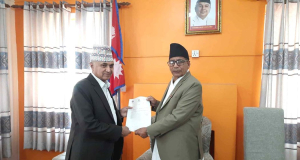President Bidya Devi Bhandari on the recommendation of the Council of Ministers issued seven ordinances on Tuesday, six days before the special session of the House of Representatives is scheduled to begin.
President Bhandari issued ordinances related to sexual violence, criminal offenses and procedures, medicine, the Constitutional Council, social security, Nepal Police and state police, and acid attacks.
These ordinances had already been issued earlier, but they were re-issued as Article 114 of the constitution stipulates that an ordinance becomes inactive within 60 days of the commencement of the House session if it is not passed by the parliament.
Hence, the ordinances were re-issued in exactly the same manner before they became inactive.
The House of Representatives was reinstated and the first parliamentary session was convened on March 7 after the Supreme Court ruled Prime Minister KP Sharma Oli’s decision to dissolve the House of Representatives unconstitutional.
As per the constitution, ordinances issued in the absence of parliamentary sessions should be presented and passed as bills in the first session of the re-convened House meeting.
This, however, could not happen when the House was reinstated on March 7.
Usually, the government is supposed to issue ordinances as exceptions rather than making it a regular process.
Nonetheless, the incumbent government has been issuing ordinances as a regular activity despite being required to issue decrees only after confirming the justification of the grounds and reasons for not waiting for the session of the parliament.
The Constitutional Council Ordinance is the most controversial of the decrees issued by the president.
Critics believe that the government, which has already filled the posts in various constitutional bodies through ordinances, is now trying to fill the posts in the Public Service Commission and other bodies in a unilateral manner.
All the posts in the Public Service Commission are vacant at present.
The validity of the Constitutional Council Ordinance is currently under consideration in the Constitutional Bench of the Supreme Court.
Advocates say that the government had re-issued the ordinance despite its legitimacy being under consideration in the court, and doing so did not hold water.




